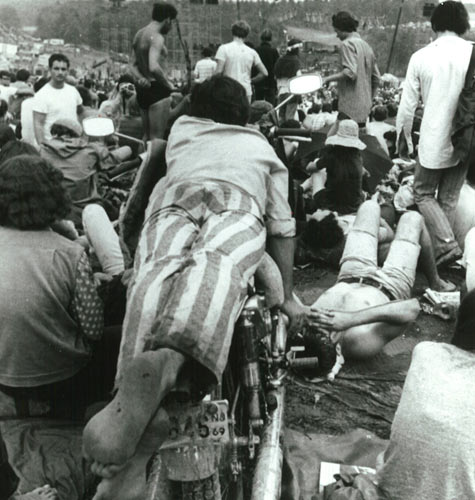Friday, August 14, 2009
Posted at
05:05
by
Carly Carioli

Because we're just as fed up with the recent crop of Woodstock nostalgia as you are, we suggest reading the piece this week where Ed Ward trains his bullshit detector on the original 3 days of peace, love, and whatever it was.
The story my students told was reported not from
a helicopter passing overhead but from the (muddy) ground. There were
way too many people there, they said, and you couldn't see or hear
anything. There was no place to camp properly, and the whole thing, as
one guy put it, "was like Boy Scout survival camp with dope." The
grounds got filthier and filthier; since there was no place to dispose
of garbage, it smelled. And when the members of their little group had
found each other again and decided to leave, that too was almost
impossible because of the mobs coming in. (It didn't help that they'd
decided to hitchhike there and back, of course.) "And the worst of it
was, we'd spent all this bread for tickets, and they just let everyone
in for free. If we'd known that, we could've saved a lot of money."
And, because nobody seems to be resurfacing any of the original reportage, it's instructive to read KEN EMERSON's review of Woodstock from back in 1969: the opening photo looks like a still from M*A*S*H*, and Emerson -- writing in the immediate aftermath of the event -- doesn't sound like he's been to Utopia:
We arrived to find Sweetwater's vocalists
engaged in a shouting match which generated little excitement. What
generated much disappointment were the discoveries that "cokes and
hotdogs and dozens of curious food and fruit combinations to experiment
with" were out of sight and over-priced, that there was no water (we
brushed our teeth the next morning with concentrated grape juice), and
that Sweetwater was shouting because that was the only way to make
one's self heard by 450,000 people. That boded no good for Tim Hardin,
the Incredible String Band, Joan Baez, Ravi Shankar, and Arlo Guthrie,
all of whom were scheduled to appear that evening.
Far from being an impromptu cultural moment, the mythology of Woodstock was being shaped even before the event took place. Fifteen years ago, the Phoenix's Al Giordano went deep and deconstructed the events leading up to the concert:
"I knew it was going to be a huge event because
its mythology was so big that people were making up these amazing
stories about it," [Abbie] Hoffman told Joel Makower, author of Woodstock: An Oral History. "And it was at that point I approached the promoters."
This year, we also dug up a preview that ran the week before Woodstock -- which shows that people were wondering in the lead-up to the concert how Woodstock would avoid the crowd problems that had recently plagued another northeast festival gig:
Can a Pop Festival, in its first year, find
happiness and success as a "three-day festival of peace and music"? Can
the Woodstock Music and Art Fair present "An Aquarian Exposition" in
Wallkill, N.Y. August 15-17 and avoid the riots and near-riots which
have plagued the Newport (California and Rhode Island) Festivals, and
which caused the town of Newport, R.I. to cancel the premiere of Blind
Faith? Can Woodstock Ventures, Inc. "do something right"?
In the Atlantic this week: former Phoenix staffer JAMES PARKER takes a peek back at Woodstock, and the movie that replaced the event in our public memory. But what really filled our hearts with joy is that Parker is back on the multimedia train. Here he is talking over some clips of Woodstock 1969 and Woodstock 1999, in a style distinctly recalling his weekly video poems for this website not so long ago . . . such as the one about how Kangaroos don't fart.